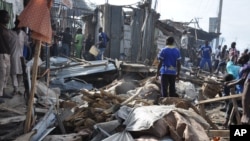Some Nigerian leaders say increasing Boko Haram violence is deepening the division between the mostly Muslim north and the mostly Christian south. Northerners, who live in the south, say that as the violence spreads, southerners are becoming suspicious of northerners in their midst.
Insurgents began attacking northern Nigeria five years ago but as recently as last year, southerners were saying "Boko Haram is a northern problem."
This year, however, thousands of people have been killed and Boko Haram has hit the centrally located capital three times. Two days ago, the group claimed responsibility for a bombing in the southern city of Lagos, the country’s financial capital and largest city.
Northerners that live in the south say their neighbors are getting anxious, paranoid that any northerner may be associated with Boko Haram.
Musa Ihiyaka Amande, a Muslim community leader in a region known as the ‘South-South’, said, “Because of insurgency that every Muslim staying down there, or northerners staying down there will be seen as Boko Haram.”
Amande complained that northerners -- both Christian and Muslim -- were discriminated against in the south. He said some were arrested arbitrarily by authorities who said they were searching for weapons.
And even if the insurgency never reaches the south, he fears increasing tensions ahead of what is expected to be a volatile election year.
In 2011 post-election violence, nearly a thousand people were killed in Nigeria’s "Middle Belt" when southerner President Goodluck Jonathan defeated his northern competition. In 2015, Jonathan is expected to run again, despite accusations that he’d be breaking a power-sharing agreement that calls for a northern leader.
Suleman Ahmed, the deputy chairman of the Civil Rights Congress of Nigeria, said tensions were already interfering with constitutionally guaranteed freedoms.
“Freedom of association, freedom of settlement, for people to settle everywhere as long as they belong to the country,” he said.
Nearly 500 northerners were arrested as they traveled south last month. Authorities later claimed Boko Haram leaders were among the travelers, but many northerners were outraged, saying mass arrests are publicity stunts in a region where locals are already prone to suspect the northerners in their neighborhood.
(Ibrahima Yakubu contributed to this report from Kaduna.)









